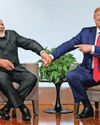Mosul, the last bastion of Islamic State in Iraq, could fall any time to the allied offensive. The human cost of one of the bloodiest battles in recent times has been huge. THE WEEK reports from the danger zone.

At the entrance of the Hasan Shame refugee camp, 20 kilometres east of Mosul in northern Iraq, women fleeing Islamic State remove their niqabs and burqas and hang them on a wire fence. Families torn apart by war are regrouping for the first time in two years. Sisters, brothers and cousins embrace in tears. Many of them had lost contact with each other, while the lucky ones were able to hide cellphones in holes dug into the floors of their homes.
The US-led offensive on Mosul, the last major stronghold of IS in Iraq, began on October 17. As Iraq’s second largest city, Mosul once housed Kurds, Sunni and Shia Muslims and Christians. With most of its residents either displaced or being held to ransom by IS, the city is at the centre of a humanitarian crisis. Relief organisations expect the offensive to create at least one million internal refugees, which will add to the 3.3 million who have already been displaced.
The fate of all of them is in the hands of a mosaic of forces that today are fighting, apparently, for a common cause: the Iraqi army, the Kurdish peshmerga, the Shiite militia Hashed al Shabi, the most dangerous in the field, and several other local militias, each ready to claim their own power.
It was in June 2014 that IS captured Mosul, forcing two Iraqi army divisions to flee the city they were supposed to defend. In two years, IS imposed sharia on the city’s population, forced thousands of Christians to flee their homes, confiscated their money, destroyed their churches and executed all Sunni and Shiite opponents. During his recent visit to Iraq, Filippo Grandi, UN high commissioner for refugees, termed the protection of civilians as the most important component of the military operation to liberate Mosul. The high commissioner’s office will need at least $200 million to effectively deal with the crisis at hand. At the moment, though, funds at its disposal do not exceed 38 per cent of the figure.
Esta historia es de la edición December 04, 2016 de THE WEEK.
Comience su prueba gratuita de Magzter GOLD de 7 días para acceder a miles de historias premium seleccionadas y a más de 9,000 revistas y periódicos.
Ya eres suscriptor ? Conectar
Esta historia es de la edición December 04, 2016 de THE WEEK.
Comience su prueba gratuita de Magzter GOLD de 7 días para acceder a miles de historias premium seleccionadas y a más de 9,000 revistas y periódicos.
Ya eres suscriptor? Conectar

The female act
The 19th edition of the Qadir Ali Baig Theatre Festival was of the women and by the women

A SHOT OF ARCHER
An excerpt from the prologue of An Eye for an Eye

MASTER OF MAKE-BELIEVE
50 years. after his first book, Jeffrey*Archer refuses to put down his'felt-tip Pilot pen

Smart and sassy Passi
Pop culture works according to its own unpredictable, crazy logic. An unlikely, overnight celebrity has become the talk of India. Everyone, especially on social media, is discussing, dissing, hissing and mimicking just one person—Shalini Passi.

Energy transition and AI are reshaping shipping
PORTS AND ALLIED infrastructure development are at the heart of India's ambitions to become a maritime heavyweight.

MADE FOR EACH OTHER
Trump’s preferred transactional approach to foreign policy meshes well with Modi’s bent towards strategic autonomy

DOOM AND GLOOM
Democrats’ message came across as vague, preachy and hopelessly removed from reality. And voters believed Trump’s depiction of illegal immigrants as a source of their economic woes

WOES TO WOWS
The fundamental reason behind Trump’s success was his ability to convert average Americans’ feelings of grievance into votes for him

POWER HOUSE
Trump International Hotel was the only place outside the White House where Trump ever dined during his four years as president

DON 2.0
Trump returns to presidency stronger than before, but just as unpredictable